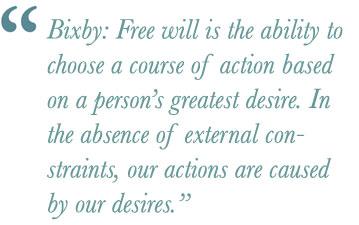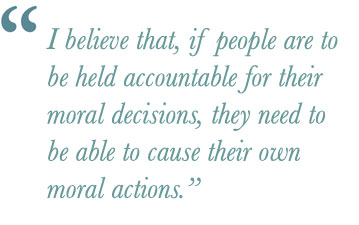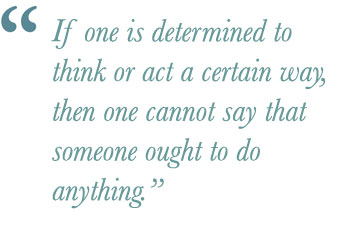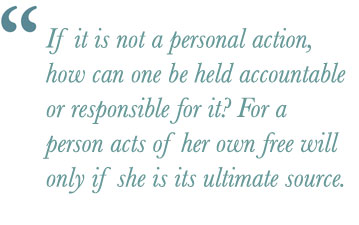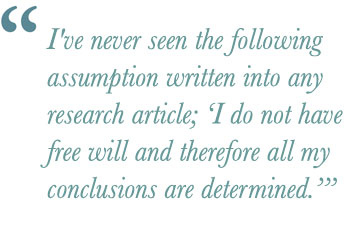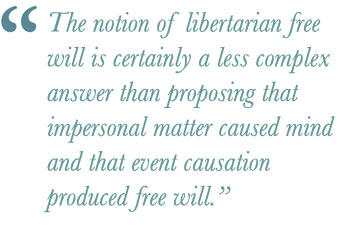By David P. Diaz, Ed.D.
Background

The following essay exemplifies the “Socratic Method,” a form of argumentative dialogue featuring a question-response technique. The method is thought to represent the “spirit” of Socrates’ debating style, which meticulously questions another’s point of view.
In the current debate, Socrates defends the notion of “libertarian free will.” His debate opponent, Bixby, acknowledges “materialism” and “determinism” as the foundation of his worldview. Bixby also describes “event causation” and attempts to resolve the conflicts of determinism through the ameliorating efforts of “compatibilism.”
Compatibilism endeavors to make determinism compatible with the notion of free choice. Since there are different forms of compatibilism, I have tried to allow Bixby some freedom to adjust his views “on the fly” while addressing his internal concerns that humans have some level of freedom. As we will see, Bixby shifts his viewpoint during the dialogue to preserve materialistic determinism. Though he wants to believe in free will, Bixby’s underlying presuppositions about reality require him to defend his core beliefs against a libertarian (volitional) notion of free will.
Dialogue
Socrates: So, my dear friend Bixby, today we are discussing the question: “Does man have free will?” I cannot think of a better and more important topic to discuss on such a fine day, especially since my counterpart in this discussion is such a dear friend. I do hope that our exchange will be profitable and will lead us to some degree of clarity on this topic.
Bixby: My dear Socrates, you are my closest confidant, and I can think of no better person with whom I would want to debate this topic.
Socrates: Before we commence the debate in earnest and to prevent any misunderstandings, I would first like to clarify your views. Please tell me how you define the term “free will.”
Bixby: Free will is the ability to choose a course of action based on a person’s greatest desire. In the absence of external constraints, our actions are caused by our desires.
Socrates: Well said. Now, then, let us begin by considering this notion of the freedom to choose a course of action based on one’s desires. Isn’t it so that many animals express some type of “goal-directed behavior”? Do we suppose them to be free in the same sense as humans?
Bixby: No, you are correct. I should say that, for our purposes, the concept of free will can be limited to human beings, a unique subspecies of animal. After all, no other animals have the capacity to reflect on their own actions or contemplate their future, as do humans.
Socrates: So then, am I correct in thinking that you have limited your definition of free will solely to humans and specifically to their ability to choose a course of action based on their desires?
Bixby: You are correct.
Socrates: And do you believe that free will, as you’ve described it, represents the reality for humans? That is, do you think that humans, indeed, have free will?
Bixby: To be clear, I believe that a person can and does choose to act based on her desires. However, I believe the notion of free choice is compatible with determinism and event causation.
Socrates: I see. So, what exactly do you mean by “determinism?”
Bixby: Materialism is the fundamental belief that all that exists is matter (this concept encompasses not only material entities that are spatially extended but also fields and forces). Since the universe acts in accordance with laws of cause and effect and since those laws are in some way attributable to matter, all actions must be determined by material causes. (This position naturally flows from materialism.)
Socrates: And how is determinism related to “event causality”?
Bixby: Every effect has a cause, including human actions, and each cause has a material source. That is, every effect is derived from some configuration of matter, energy, and/or fields that exist in the universe. Event causality (or event-event causation) is exhibited when one event causes another event, which causes another event, and so on into the indefinite future (e.g., Event 1: a bowling ball is rolling; Event 2: the ball hits the pins; Event 3: the pins scatter in a certain way, etc.). There is always a deterministic or probabilistic law of nature that connects each of the events. So, when humans choose to do this, or that, material causes/events determine the outcome. Thus, humans choose an action, but their will is also causally determined. People always choose what they desire, but what they desire is determined.
Socrates: I see. So, our choices are not self-caused but represent a desire to perform a particular act, and these desires are determined by something other.
Bixby: That is correct. Previous events and causal laws determine all effects, including human actions. Further, unless a person is causally determined to perform a specific action, then performing that act must be a matter of chance. In this view, it is only when actions are determined that they can be considered free; otherwise, they are compelled. Thus, free will requires determinism.
Socrates: So, if events determine thoughts and actions, then they could not be self-caused or volitional. Am I correct?
Bixby: You understand correctly.
Socrates: Does that mean you don’t believe you can make voluntary choices in your day-to-day life?
Bixby: I don’t believe we can make self-caused choices because events, not “self,” dictate actions. A long chain of events, which extends into the past indefinitely, determines every action.
Socrates: But I would venture to guess that you act in your everyday life as if you can choose between, say, Salami & pickles on rye, on the one hand, and ham & cheese on wheat, on the other. And you probably wouldn’t try to convince your wife that she is deluded in thinking she is free to select one book to read rather than another. And, for that matter, you would most likely sidestep altogether the thought that she ought to appreciate the impact drill you bought her for her birthday (because you were determined to make this choice). How, then, do you explain that humans have a commonsense or self-evident notion that we can freely choose?
Bixby: [Ahem!] Well, first of all, my wife wouldn’t appreciate this type of discussion. Which is to say, we should keep this matter of the impact drill between us. I will return it to Home Depot posthaste!
Socrates: Ah, well said, sir. Please, proceed…
Bixby: I was thinking that the most important questions about free will are not related to free will per se but are related to moral responsibility. It seems insufficient to talk about free will apart from ethical choices.
Socrates: Indeed! So, how would you describe “moral responsibility”?
Bixby: Morality entails moral obligations or duties for which a person is held accountable. When a person makes moral decisions that result in actions, she becomes a valid target for moral praise or blame, as well as for reward or punishment. In other words, one ought to do certain things because they are right and just.
Socrates: Fine then, should we add this point about moral responsibility to your definition of free will?
Bixby: Yes, I should probably adjust my definition of free will at this point. I should now say that free will is “the unique ability of persons to exercise control over their conduct in the manner necessary for moral responsibility” (Stanford Encyclopedia of Philosophy, “Compatibilism”).
Socrates: Well then, I think your new definition agrees with my concept of libertarian free will. However, there are some critical differences in how we each understand this definition. I believe that free will is not a product of events but is self-caused (i.e., agent causation). There are no conditions that exist inside me that determine that I raise my arm, wiggle my toes, or commit armed robbery. Indeed, if people are to be held accountable for their moral decisions, they must be able to cause their own moral actions. Libertarian free will is self-caused freedom. I believe that, for every ethical decision, a person can choose one action or another or even choose not to choose. But you, Bixby, believe that one is only free to choose what one desires, which happens also to be determined. So, apparently, you don’t believe in libertarian free will.
Bixby: True enough.
Socrates: I would like to return to your idea of free will as merely reflecting one’s desires. You said, “In the absence of external constraints, our actions are caused by our desires.” I am assuming that when a person has a gun held to the back of her head, this would represent an “external constraint”?
Bixby: Correct. Free will is the ability of an agent to act as she wants unencumbered. In your example, the agent is compelled by external factors to act contrary to her will.
Socrates: But what about the case of a person suffering from a form of psychosis that causes full-fledged hallucinations? While hallucinating, she might “act as she wants unencumbered,” but she could hardly be said to be acting of her own free will. And couldn’t the same be said of a person addicted to drugs?
Bixby: I agree that such conditions are problematic.
Socrates: What about your idea that morality means that one “ought” to act according to moral standards? How does this square with the notion of determinism? After all, if one is determined to think or act a certain way, then one cannot say that someone ought to do anything (“ought” implies “can”). If determinism is true, one could not do anything authentically right (or wrong) because one couldn’t act otherwise. And, if actions are determined, then, by definition, they couldn’t be volitional.
Bixby: I must concede the point.
Socrates: And what of event causation? If an event causes a moral action, could it be considered a personal action?
Bixby: It could not. An event is ultimately impersonal. It results from a materialistic causal chain of events attributable to laws of chemistry and physics.
Socrates: If it is not a personal action, how can one be held accountable or responsible for it? A person acts of her own free will only if she is its ultimate source, which would not be the case if the action is merely a series of events that trace back to factors that existed prior to the action.
Bixby: I see where you are heading with this.
Socrates: Doesn’t the existence of an impersonal, determined action contradict any notion that holds people accountable for moral actions?
Bixby: Well, I can answer that, but to do so, I would need to posit a slightly different viewpoint.
Socrates: By all means…
Bixby: Hierarchical compatibilism offers a different solution to your problem. This form of compatibilism distinguishes between first- and second-order desires. Freely-willed actions are those that arise from desires that suitably mesh with hierarchically ordered elements of a person’s psychology. The general idea is that a person who acts of her own free will does so based on desires nested within more encompassing elements of the self. When a person acts on her own desires, those motives are hers; she owns them. She acts of her own free will if, and only if, her action issues from the will she wants. So, some actions are genuinely free. I agree with Harry G. Frankfurt when he says, “It seems conceivable that it should be causally determined that a person is free to want what he wants to want. If this is conceivable, then it might be causally determined that a person enjoys a free will” (Watson, 2011, p. 336).
Socrates: But what of the example of a person with an addiction, of whom it could be said, has acted freely, but for whom it was, practically speaking, impossible? In other words, because of her addiction, she had no alternative and, therefore, was not able to choose in a valid sense. Doesn’t the effect of addiction cause the addict’s second-order willingness? So that, by desiring to take her drug of choice, she is merely having her will manipulated and is not free to choose?
Bixby: Well, when you put it that way, no. Though she had more than one option before her, there was only one she could choose. In that sense, it is easier to simply claim that she was determined to act one way in every sense of the word. However, only those actions truly owned by a person can be considered free. Anything other, as in your example, is not a free action.
Socrates: So, it appears that the free will of compatibilism is inferior to libertarian free will because the compatibilist is only “sometimes free.”
Bixby: I understand the dilemma only too well.
Socrates: You have said that compatibilism affirms that some actions can be free in an event-causal universe. But how does free will arise from a determined universe?
Bixby: I guess you are asking, “Where does event causation stop and human free will begin if everything derives from materialistic causes?”
Socrates: Bingo! Can you see the conflict between your belief in determinism (compatibilism’s “sometimes free” will) and the belief in libertarian free will? And do you also see how compatibilism does not answer the ultimate question of the appearance of free will in a determined universe? At best, compatibilism seems to say that there is sometimes “freedom of action” but not freedom of will.
Bixby: Yes, I can see that.
Socrates: And if compatibilism means believing in “event causation,” then “free will” is a misnomer because “volition” would be merely the product of blind physical processes. But how can an impersonal event be responsible for personal moral choices? Apparently, compatibilism’s definition of free will does not acknowledge that personal agency is necessary for moral accountability.
Bixby: Maybe so, but compatibilism is a pragmatic way of looking at the problem, for it attempts to resolve the apparent contradiction between free will and determinism.
Socrates: But, if truth is defined as “whatever works” (i.e., pragmatism), then isn’t truth relative to a given individual at a given time? What if “what works for me” is to rob you at gunpoint to satisfy my financial needs? Is the proposition “It is morally right to rob someone to satisfy one’s financial needs” true? Or what about the opposite proposition, “It is not morally right to rob someone to satisfy one’s financial needs.” Is the truth or falsity of these opposing claims decided merely on what works for the individual?
Bixby: Indeed.
Socrates: But is everything that works, or that is successful in achieving some end, also true? For the pragmatist, the same proposition can be both true and false. How can determinism be true if different individuals are determined to believe or disbelieve it? It seems that truth is fickle for the pragmatist.
Bixby: Well, I can’t think of a response at the moment.
Socrates: So, perhaps determinism isn’t true. If determinism were true, would this not make a mockery of our legal system?
Bixby: In what way?
Socrates: Well, as you’ve already stated, when witnesses take the stand, they are told to tell the truth under threat of perjury. According to our justice system, a witness is judged perfectly capable of telling the truth or lying.
Bixby: Yes, that is the assumption.
Socrates: But on what basis could they be judged truthful (or untruthful) if they are determined to believe and say what they do? Wouldn’t a lie be the same as the truth?
Bixby: It would seem so.
Socrates: And what of the objectivity of science? Wouldn’t the absence of free will undermine the scientific disciplines?
Bixby: I’m not sure what you mean.
Socrates: Science is based on the notion of free will: the freedom to choose one method of examining data over another, one statistic over another, one observation method over another, etc. When writing up their research results, scientists don’t think twice about whether they have free will. I’ve never seen the following assumption in any research article; “I do not have free will, and therefore, all my conclusions are determined.” For indeed, any such claim would undermine objectivity. The clear, if unspoken, assumption among scientists is that we have free will. How can this be explained?
Bixby: My only answer would be to assert, as I did earlier, a slightly weaker form of determinism. Maybe the mind is somehow separate from matter. If so, then perhaps we do have some level of libertarian freedom. It may be that physical processes are required to generate the mind, but then something else comes into play—something like freedom of choice, an immaterial mind, or both.
Socrates: Your assertion, “physical processes are required to generate mind,” entails the following unstated assumption: Material processes cause mental events. While it may be true that the mind is reducible to matter, you can’t smuggle in an assumption that proves your conclusion without begging the question.
Bixby: Yes, well, I do see your point, but obviously, moral decisions are common to all humans, and therefore, there must be some manner of allowing for moral and ethical choices. Otherwise, how can we explain such examples of exemplary restraint and apparent good deeds if the determinist cannot make free moral decisions?
Socrates: Well, one could simply assert that God is the source of all goodness, that he has endowed humans with the power to make moral choices freely, and that moral responsibility is our attempt to follow his moral standard. That God equipped humans with libertarian free will is undoubtedly a less complex answer than proposing that impersonal matter caused our minds and that event causation somehow produces free will.
Bixby: Well, I am not ready to concede the point just yet.
Socrates: Let me remind you that if our thoughts and actions are determined, we must relinquish all claims to truth, rationality, and morality. If events cause our beliefs, then they cannot be true in a strict sense. For how can any proposition be true (or false) if we are determined to assert or believe it? Indeed, how could any beliefs be rational if they are the product of blind, irrational forces? Wouldn’t moral decisions be inconsequential if we cannot choose otherwise?
Bixby: Yes, it does seem difficult to believe in exclusive truth, rationality, and morality if, indeed, our thoughts and actions are determined.
Socrates: Have you considered the ethical implications of imprisoning anyone for violating moral codes or laws in a deterministic world?
Bixby: Unfortunately, I have. Violations and punishment for breaking laws become thorny issues. If our actions are determined, crime and punishment are ultimately arbitrary.
Socrates: I assert, then, that libertarian free will (i.e., agent-caused actions) represents what most of us believe intuitively: Humans are free to act and can initiate new causal chains for which we are always genuinely responsible. We are not enslaved to fate, causality, or science but can freely choose many of our actions. So, do you still not believe in libertarian free will?
Bixby: I desperately want to believe in free will. Moreover, I mostly live my life as if I have libertarian free will. But my naturalistic, deterministic worldview prevents me from believing in your version of free will.
Socrates: First, I can understand why you want to believe in free will. As I have said, libertarian free will is self-evident; it represents a commonsense view of our existence. Second, a determinist must remain ambivalent to the notion of truth, rationality, and morality. And third, it appears that the price of determinism is too high. If you can’t consistently attribute moral actions to an agent (i.e., self-caused actions), then one cannot have truly free actions. But how, then, can people be held morally accountable for their actions? Ultimately, all forms of compatibilism are incompatible with libertarian free will.
About the Author
David P. Diaz is an independent researcher and retired college professor. His writings have ranged from peer-reviewed technical articles to his memoir, which won the 2006 American Book Award. Dr. Diaz holds Bachelor’s and Master’s degrees from California Polytechnic State University, a Master’s in Philosophical Apologetics from Houston Christian University, and a Doctor of Education specializing in Computing and Information Technology from Nova Southeastern University.
Special Thanks
Thanks to Dr. Miguel Endara for reading and commenting on this essay.
References
Grasso, D., E-mail correspondences to author, July 26, 2017; August 16, 2017.
Internet Encyclopedia of Philosophy, Free Will.
Lench, A. (2016). Does Drug Addiction Prove Free Will? Journal of Cognition and Neuroethics, 4(2). Retrieved September 18, 2017.
Stanford Encyclopedia of Philosophy, Compatibilism.
Stanford Encyclopedia of Philosophy, Free Will.
Sweis, K. A., & Meister, C. V. (2012). Christian apologetics: An anthology of primary sources. Grand Rapids, MI: Zondervan.
Watson, G. (2011). Free will. Oxford: Oxford University Press.
